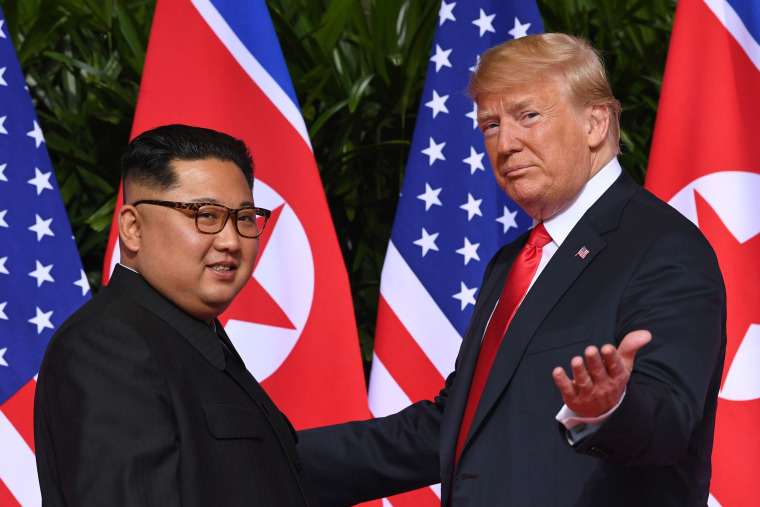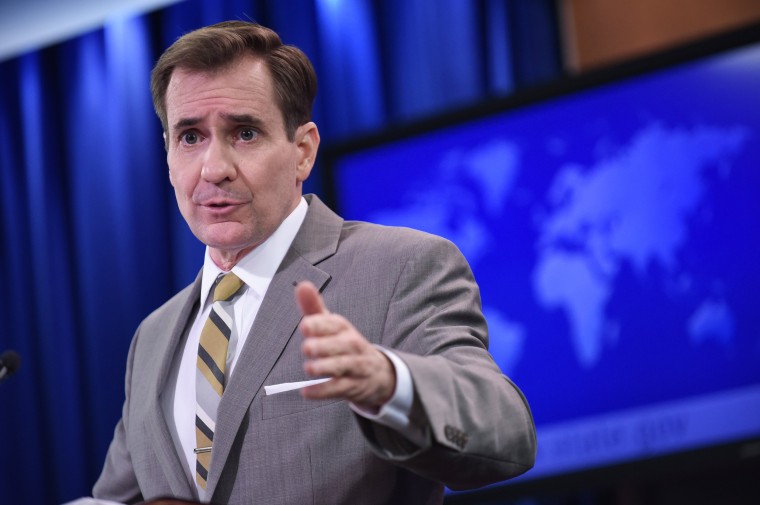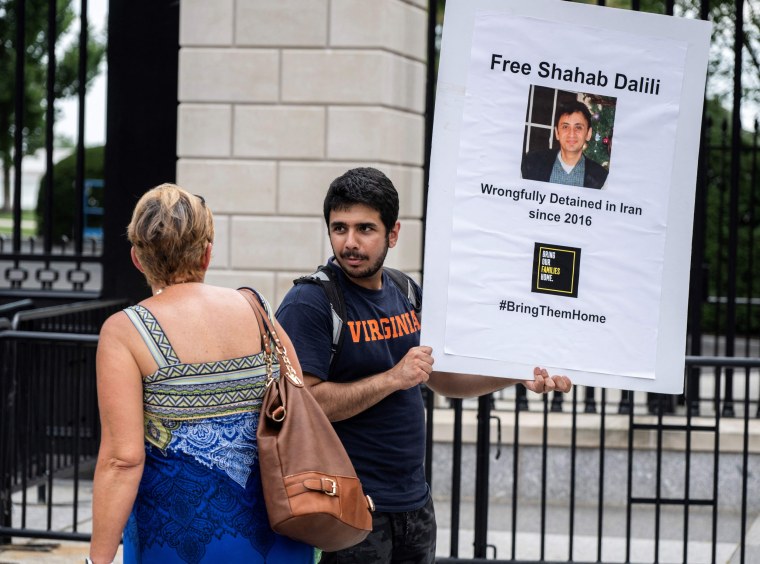President Joe Biden is coming under fierce criticism from Republicans in Congress for a prisoner exchange deal with Iran that will grant Tehran access to billions of dollars in oil revenues previously frozen by U.S. sanctions.
But Biden is not the first U.S. president to make concessions to hostage takers, and to face political heat back home over his decision.
What’s different this time is that Biden and his team are making no secret of the link between the funds unblocked for Iran and the freedom of five imprisoned Americans, explicitly acknowledging the trade-off.
Some of the officials involved in the planned prisoner swap, due to take place any day, were involved in a similar agreement with Iran during the Obama presidency, but this time the rhetoric is less evasive.
“The reality is that hostages come home in negotiated settlements,” said Washington Post columnist Jason Rezaian, who spent 544 days imprisoned by Iran until his release in January 2016. “There is always some sort of concession.”

Biden’s predecessor, Donald Trump, agreed to prisoner swaps with Iran involving Iranian nationals prosecuted in U.S. courts, and held a summit with North Korean leader Kim Jong Un in 2018 after three detained Americans were released.
In the 1980s, Ronald Reagan’s administration secretly sold weapons to Iran to try to win the release of Americans held by Iranian-backed proxies in Lebanon, a scheme that Reagan initially denied but later apologized for. Other U.S. administrations have faced accusations of giving a green light to third parties to deliver ransom payments to secure the freedom of American hostages.
U.S. law prohibits paying ransom to terrorist groups seizing American hostages, part of a “no concessions” policy that dates back to the early 1970s. But Americans unjustly imprisoned by other governments are defined as “wrongfully detained,” and U.S. law does not prohibit the executive branch from offering concessions to another state to get them out.
In Rezaian’s case in 2016, the Obama administration transferred $400 million in cash to Iran at the same time Rezaian and other imprisoned Americans were freed, followed by another $1.3 billion. The money stemmed from a decades-old dispute between the U.S. and Iran over funds set aside for U.S. arms sales that were aborted after the 1979 revolution that toppled the pro-American monarchy in Tehran. The Obama White House said negotiations with Iran over the $1.7 billion settlement were separate from discussions about the prisoner release.
The payments and prisoner release coincided with the January 2016 implementation of a nuclear deal the Obama administration and other world powers reached with Iran. The White House at the time announced it had reached a settlement with Tehran on the decades-old arms deal but did not disclose the timing of the payments.
When the details about how the administration made the payments became public months later, White House officials insisted it was merely a coincidence that wooden pallets of cash were flown to Iran just as the American prisoners were released. President Barack Obama defended the decision when asked about it at a news conference, saying the money was not payment for the Americans’ release.

The State Department spokesperson at the time, John Kirby, later conceded that the administration had used the $1.7 billion as “leverage” to obtain the American prisoners’ release and refused to hand over the money until they had taken off on a flight from Tehran.
This time, the Biden administration, which includes Kirby and many other officials who were involved in the 2016 episode or worked for the Obama administration, made no effort to play down the link between the money being released and the planned release of prisoners.
“The Biden administration has been much more open about some of these difficult choices” in negotiating the release of detainees, including the latest agreement, said Vina Nadjibulla, a senior research fellow at The Soufan Center, an independent organization for research and policy on global security issues.
Secretary of State Antony Blinken made no apologies for the prisoner swap deal when asked about the agreement on Friday.
“When it comes to getting Americans out of jail and back home, and unjustly detained anywhere in the world, I’m happy to take any criticism that comes my way. for that,” Blinken told reporters. “I view it as job one to do everything I can to bring Americans home.”
The United States and other Western governments have few points of leverage when a terrorist organization or an authoritarian government imprisons their citizens as bargaining chips. Negotiations often revolve around prisoner swaps, policy changes or releasing frozen assets.
“Iran is not going to release these American citizens out of the goodness of their heart. That is not real life. That is not how this works,” State Department spokesperson Matt Miller said earlier this week in defense of the prisoner swap terms with Iran. “We have to make tough choices and engage in tough negotiations to bring these American citizens home.”

The Biden administration also has been criticized for not including detained U.S. legal residents in the prisoner swap deal, given that Washington agreed to give Iran access to such a large sum of frozen oil revenues.
The prisoner exchange only applies to five American citizens, but not detainees like Shahab Dalili, who holds a green card and whose children and wife are all U.S. citizens. His son, Darian, recently held a sit-in for days outside the State Department, demanding his father be included in the swap and accusing the administration of betraying his father.
Dalili and other green card holders, including Jamshid Sharmahd, a software developer living in California who was kidnapped during a 2020 stopover in the United Arab Emirates and taken to Iran, have not been officially designated by the U.S. government as “wrongfully detained,” which would oblige the administration to take more decisive action.
When asked about prisoners with green cards, State Department spokesperson Vedant Patel told reporters recently that the department is “not going to get into the specifics of specific cases.”
Previous presidents from both parties have made uncomfortable trade-offs to get Americans out of captivity. During Trump’s tenure, an American and an Australian held by the Taliban were released in 2019 as part of a deal that saw the release of three Taliban leaders from Afghan jails. The move came as U.S. officials were trying to get peace talks moving with the Taliban.
But skeptics say Biden’s prisoner exchange deal with Iran goes too far and rewards Tehran for imprisoning Americans.
“Iran took full advantage of President Biden’s appeasement strategy,” said Republican Sen. Joni Ernst of Iowa, saying the prisoner exchange agreement would put more Americans at risk and put money into the hands of “the number one state sponsor of terrorism.”
“This should serve as a reminder that Iran is not to be trusted, especially as this administration pursues a flawed nuclear agreement with Tehran,” Ernst said in an email to NBC News.

A former senior Trump administration official called the deal “bad policy” that encourages further hostage taking.
“We proved repeatedly that America can rescue hostages without paying ransom. In the case of Iran alone, we negotiated the release of two Americans without sanctions relief, cash payments or a change in the policy of maximum pressure,” said the former Trump official.
The official added, “After this latest Biden hostage deal, there is no question Iran will jail more Americans who are currently enjoying their freedom, because of this policy of paying for hostages.”
Since the 1970s, researchers examining whether ransom payments result in more seizures of hostages have found a mixed picture with contradictory trends. The Biden administration says the term “ransom” does not apply to the prisoner exchange with Iran, as it involves lifting a freeze on oil revenues that belong to Iran.
Hostage taking by terrorist organizations has gradually declined in recent years, but the number of Americans wrongfully imprisoned by foreign governments has been rising for more than a decade. Most of the detentions are carried out by a handful of countries, China, Iran, Russia and Venezuela, with great power rivalries fueling the “hostage diplomacy.”
However, a new report released Wednesday showed the number of Americans held hostage or wrongfully detained abroad has fallen for the first time in over 10 years. At least 59 Americans are currently held hostage or wrongfully detained abroad.
Since August last year, 25 wrongfully detained Americans have been released, the largest number of American prisoners freed in one year, according to the report by the Foley Foundation, a nonprofit that advocates for the freedom of journalists and Americans held hostage abroad.
Families of former hostages and other advocates believe the trend reflects a change in how the U.S. government now approaches cases of detained Americans after new legislation was adopted and new offices and policies crafted. The murder of several American captives by ISIS militants in 2014 prompted President Obama to launch a review and an overhaul of how hostage cases were handled.
The U.S. government now has a special envoy who oversees cases of Americans held overseas. That office, along with the adoption of the Levinson Act, has given hostage cases a higher priority and more senior-level government attention, according to Nadjibulla of The Soufan Center.
But what is still missing is a concerted strategy to deter regimes from taking hostages in the first place, she and other experts said.
The U.S. and its allies need to collectively impose serious penalties on “abductor states,” including financial sanctions, travel bans or asset freezes, experts said.
“The reality is that governments like Iran’s, but also Russia, China and others are incentivized by the lack of anything credible deterring this behavior,” former prisoner Rezaian said.
At the U.N. next week, Canada and the U.S. plan to renew their effort for governments to back a declaration against arbitrary detention. Dozens of countries have already signed on, promising to take collective action.
Given the long history of wrongful detentions in Iran, some former officials have floated the idea of banning Americans from traveling to Iran, just as the U.S. has with North Korea. U.S. passports are invalid for travel to North Korea without special exceptions granted by the secretary of state.
Hostage taking presents painful dilemmas for American presidents, with high stakes for U.S. national security and domestic politics. The Iran hostage crisis in 1979, in which 52 Americans at the U.S. embassy were held captive for more than a year, arguably cost Jimmy Carter the White House. For the victims and their families, the toll of indefinite incarceration is excruciating.
Wall Street Journal reporter Evan Gershkovich has been imprisoned in Russia since March, and at a press conference in New York on Wednesday, his mother spoke of the agony of her son’s plight.
“Evan has now been wrongfully detained by Russia for nearly six months for doing his job as a journalist,” said his mother, Ella Gershkovich. “We are still in shock. Every day is a day too long. I miss him every day.”








